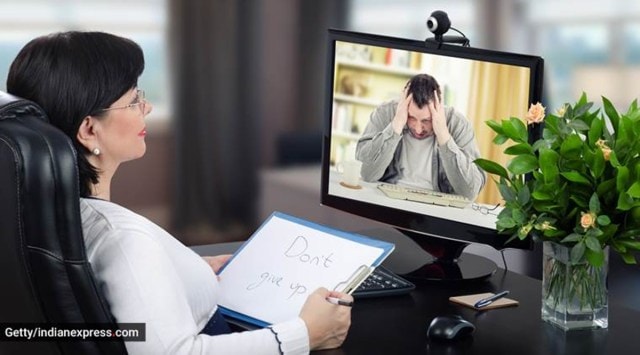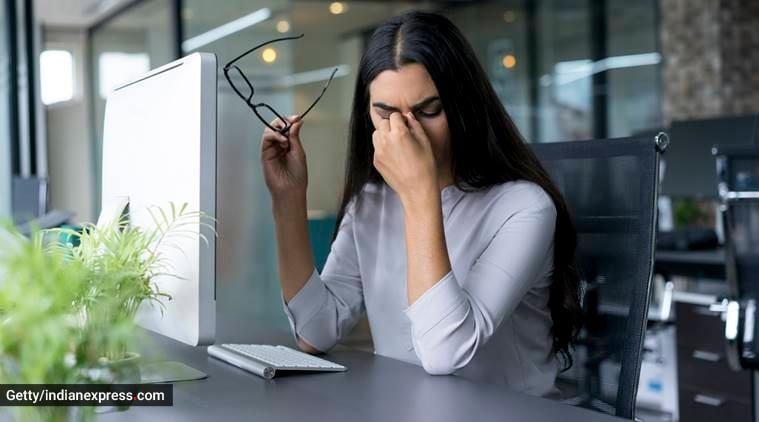- India
- International
‘Time to practise what we preach’: Therapists on taking care of their mental health amid pandemic
Mental health professionals aren't immune to the disruption caused by the pandemic. Therapists are facing the same anxiety, uncertainty, and stress that are troubling those who seek their services
 *Most young people, experiencing an emotional or behavioral problem, face stigma and discrimination from their family, and peers. (Source: Getty Images/Thinkstock)
*Most young people, experiencing an emotional or behavioral problem, face stigma and discrimination from their family, and peers. (Source: Getty Images/Thinkstock)The pandemic has not only taken a toll on people’s physical health, it has also adversely affected mental health. To seek solace, many people have turned to therapists and mental health experts, especially during the second wave. While therapists can help one make feel better despite the circumstances by motivating and sharing positive feedback, have we ever thought about how experts may be dealing with their own emotions, expressions, and psychological health amid the stress and strain of the current times?
A paper published in the Asian Journal of Psychiatry warned as far back as July 2020 that “emotional contagion, perceived stress, compassion fatigue, secondary traumatic stress, poor therapeutic effectiveness, and longer duration of therapy” could strain India’s mental healthcare workforce to a breaking point.
In light of this and the Mental Health Awareness Month of May, indianexpress.com reached out to experts to understand how they are dealing with the disruptions caused by the pandemic — the anxiety, and the uncertainty that surrounds all.
For Dr Chandni Tugnait, a Delhi-based psychotherapist and founder of Gateway of Healing, who sees 8-10 clients each day through video and audio calls and even chat support, the second wave has been “energetically challenging”. “There is sadness, fear, doubt, and uncertainty in the minds of people and they look up to their therapist for empathetic support and erudite approach in every aspect – physical, mental, emotional, social, financial, spiritual, and environmental. I am happy to help them and their near and dear ones but it can get energetically challenging at times. Also, the key here is to be available for as many people as possible and at the same time tending to the needs of self and family,” the 35-year-old told indianexpress.com.
 The pandemic has taken a toll on mental health professionals too. (Source: Getty Images/Thinkstock)
The pandemic has taken a toll on mental health professionals too. (Source: Getty Images/Thinkstock)
In the current scenario, where, as per Dr Tugnait “there is a spike in depression, anger, anxiety, and fear of the future with regards to finances, children, and life in general”, even therapists, whose demand seemed to have increased, can feel overwhelmed at times and may even experience a burnout. “I am very much human and feel overwhelmed at times. I practice the tips and techniques I share with my clients. I keep myself grounded and have open communication with my best friends who hold the space for me to be myself,” said the therapist, who contracted the virus in February 2021.

“I was in isolation for three weeks. It was difficult as I was away from my family. It was an emotional time as I was away from my daughter for 21 days at a stretch for the first time. I missed human touch and my routine with my clients. I got myself tested, took all the advice from my doctor and didn’t step out at all (even when many said I can do so after 11-12 days) until I was tested negative after 18 days,” she recollected.
According to World Health Organization (WHO), “bereavement, isolation, loss of income and fear are triggering mental health conditions or exacerbating existing ones”. “Many people may be facing increased levels of alcohol and drug use, insomnia, and anxiety. Meanwhile, COVID-19 itself can lead to neurological and mental complications, such as delirium, agitation, and stroke. People with pre-existing mental, neurological or substance use disorders are also more vulnerable to SARS-CoV-2 infection – they may stand a higher risk of severe outcomes and even death.”
Some of the struggles mental health care providers are facing in these times are adapting to teleconferencing, arranging a workspace at home, trying to re-organise work-life balance apart from their worry over infection, and mourning loved ones lost to the virus.
According to psychiatrist Dr Deepak Raheja, while virtual calls may seem easy and smooth, they have their share of challenges. “You don’t get the same connection in terms of, say, body language. Physically being present surely has a role to play in the confidence-building of someone who is suffering from a mental health issue. For typical, orthodox doctors like myself, it has thrown us in a situation where we have no option but to explore the virtual world – which also has some interesting facets. But I definitely feel physical proximity and seeing the patient in-person has more advantages,” Dr Raheja told indianexpress.com.
The toughest thing to deal with has been uncertainty. “Also knowing that even the hardest of efforts at this time isn’t going to bear fruit. There was no direct cause and effect – whether it be health, or money, or career. This period was a test of my training – to practice what I preach…and yes there were completely disastrous days where I have broken down and cried. But thankfully the therapy that has shaped me, helped me bounce back much quicker,” psychologist and hypnotherapist Pankhuri Agarwal, mental wellness expert, SARVA, told indianexpress.com.
 The toughest thing to deal with has been uncertainty for many therapists. (Source: Getty Images/Thinkstock)
The toughest thing to deal with has been uncertainty for many therapists. (Source: Getty Images/Thinkstock)
Considering that in therapy, it is mostly negative information that therapists are processing, how do they deal with it, especially in such trying times? As a quality measure, Agarwal has made it a point to see “one client per day”. “The pandemic has not affected my flow of clients. I usually attend to them on a voice call, unless they request for a video session,” she said.
The 34-year-old also happens to reach out to her therapist-friends. “I have many close friends who are also therapists, and we give each other support in times of crises. And it was wonderful to see that even my clients would check in on me to see if I was doing okay,” she mentioned.
Despite the myriad challenges, mental health professionals say healthcare providers who are suffering should always seek help.
“Frontline workers and therapists should always reach out to their peers, mentors, or other therapists for clarity in thoughts and processing of emotions in a better way. This way they can serve more people in more potent ways,” said Dr Tugnait.
“Every person needs a holding hand, a gentle touch, a listening ear, and space to just be themselves. I always say, ‘even a coach needs a coach. Interdependence is nothing to feel ashamed of. On the contrary, when like-minded, high-energy people come together to contribute, assist, collaborate, be deferential or become accountability partners, the world becomes a better place as the transformation begins to amplify at every level,” she added.
Agarwal expressed planning her activities for the day has been helping her immensely. “Being aware and grateful for every single privilege I have at this point helps a lot. That includes listing out every day what I had to be grateful for. Walking, pranayama, yoga, cooking food, talking to loved ones, silly jokes, deep cleaning the house, dressing up, self-care, helping clients, reading and watching interesting series made up my happiness cocktail,” mentioned Agarwal.
Dr Sagar Mundada, Healthspring’s mental wellness expert suggests these strategies
Grounding techniques: They help relax the anxious mind and restless body. Using the five senses to help yourself keep away from a stressful situation is a helpful technique. If overwhelmed, just take a few deep breaths, look at five things, touch four things, hear three sounds, smell two scents and taste one thing. This will help divert your overworking mind.
Control and concern circles: Study your thoughts and classify them into ones that are understood and are under control (eg: maintaining social distance and using masks) and ones that are of concern to you but you cannot control (eg: when will COVID end?). Focus only on the thoughts you can control.
Mindfulness: Using mindfulness, which primarily involves being in the present moment in a non-judgmental way. The best way to do this is by focusing on the breathing pattern that brings you back to the present moment.
 Despite the myriad challenges, mental health professionals say people who are suffering should always seek help. (Source: Getty Images/Thinkstock)
Despite the myriad challenges, mental health professionals say people who are suffering should always seek help. (Source: Getty Images/Thinkstock)
Diet: Having a nutritious meal with good amounts of carbs, fats protein, vitamins, and minerals goes a long way. Avoid junk food, very spicy or oily food. Observe if you are an emotional eater and try to avoid this tendency.
Sleep: Seven to eight hours of uninterrupted sleep is the best gift that you can give your mind and body. Recharging yourself is very necessary. Stop using mobile an hour before sleep, take a lukewarm water bath and lukewarm milk along with regular fixed sleeping and waking-up time.
Fitness: Daily squats or pushups or any physically straining aerobic activity for 30 minutes will help in the release of the feel-good chemicals of the brain called endorphins.
Seek help: If you feel disturbed, restless, anxious, constantly sad, having anger outbursts frequently, regular sleeping issues, imagining worst-case scenarios, binge-eating, and addicted to video games, alcohol, smoking, or pornography, contact a fellow psychiatrist or psychologist. There is no shame in asking for help. It takes courage to acknowledge that you have a problem.
For more lifestyle news, follow us: Twitter: lifestyle_ie | Facebook: IE Lifestyle | Instagram: ie_lifestyle
Must Read
May 11: Latest News
- 01
- 02
- 03
- 04
- 05


































